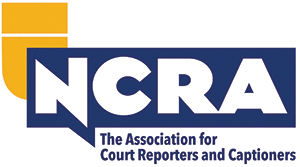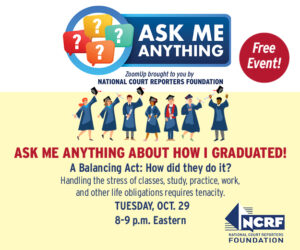I have trained many new reporters over the years, so I have had a firsthand view of the transition from student to working reporter. I gained much insight as I was training and mentoring these new reporters, and this is my advice on what students should know as they prepare to start their careers in reporting.
Tip No. 1 Ensure that your equipment is properly maintained so it is not too loud or making noise when you are writing in the courtroom. If you buy new equipment and software right after graduation, make sure you know your machine and software before going to your first assignment. You don’t want the bad experience of walking into a room filled with attorneys and not knowing how to set up your equipment. There is a natural tendency to panic when all eyes are on you. Practice setting up your equipment before your first assignment.
Tip No. 2: If your software program has audio, do not rely solely on it for your transcript. It is a great tool as a backup, but remember, you may have to read back a question or an answer. If the audio fails, it might be that the microphone was not turned on or was not plugged in correctly or there was background noise that distorted the recording. With or without the audio, you will have to produce the transcript.
Tip No. 3: Make sure you know the appropriate oaths for swearing in witnesses and translators. Practice saying the oaths before you go to your first deposition. Make a note card with the oaths on it to keep in your briefcase so you can review them before the deposition starts. Once you get used to reciting them, they will become second nature. In fact, you may have to make sure you don’t say the oath so fast that the witness misunderstands the words. Occasionally, an attorney may state something for the record first and then ask you to swear in the witness. If an attorney starts questioning and forgets to have the witness sworn, interrupt and ask if he or she would like to have the witness sworn in.
Tip No. 4: You will find that not all witnesses speak in complete sentences, which makes it difficult to punctuate. If a witness pauses in his or her answer, it may not necessarily mean that a comma belongs in that space. The witness may just be thinking about how to phrase the answer or may be ready to change his or her thought altogether, in which case you need to place a dash.
Tip No. 5: Probably the most difficult barrier to overcome is learning to interrupt. But remember, if you cannot hear the witness, mostly likely the lawyers are having the same problem. They will invariably ask you to read testimony back. If you are having difficulty hearing, ask the witness to repeat an answer or to speak more loudly or more clearly.
Tip No. 6: If possible, when reading back on the job, read the question or answer to yourself first before you read it aloud. This may save you from stumbling over a new word, a steno outline, or a mistranslate.
Tip No. 7: Another early lesson to learn is that your working experience will not be like dictation in class; it will not be five minutes at a particular speed. It will vary all throughout the day, depending on who is speaking. The lawyer may be slow and the witness fast, or vice versa.
Tip No 8: You may also be writing for two-hour stints without a break, so you may get tired at first. Writing an all-day deposition or all-day trial certainly can wear you out, especially when you first start reporting. Don’t get discouraged. Once you get used to sustained writing, it becomes much easier.
Tip No. 9: Because you don’t know what the day holds, be sure to eat a full breakfast. You never know if you will get a lunch break, and if you do, it may be a short one. Hopefully, you’ll be asked if you would like to break or you will have the opportunity to ask for a break, but it doesn’t always happen. Sometimes the need for a faster deposition means starting at 9 a.m. and going straight through to 2 p.m. with no lunch break. I have had that happen, and I find in those cases, I was very happy I ate breakfast. If you are not a breakfast person, keep a snack bar or something you can eat at a break.
Tip No. 10: When I started reporting, I acquired reference books, which were tremendously helpful. That was before computers and the internet. Make Google, or whatever search engine you use, your friend. When editing, use it. If you are not sure of something, look it up. For example, I was editing a job and it sounded like the witness said he had an Audi 88. Not being familiar with that car, I Googled it just to be sure. It turned out it was an Audi A8. Don’t be afraid to ask fellow reporters during a break if you need a spelling or clarification, or if you are unsure of a term. We are always willing to help each other.
I hope I have provided some helpful tips to guide you in the transition from student to reporter. And here is just one more: Don’t get discouraged if your first reporting assignment doesn’t leave you with a warm, fuzzy feeling. I have been reporting for over 35 years, and I still love it. That doesn’t mean I haven’t had some difficult assignments that have left me wanting to cry. But those unfavorable experiences didn’t ruin it for the other assignments — ones that have left me feeling that I chose a very rewarding career.
Jacqueline Timmons, FAPR, RDR, is a freelance reporter in Darien, Ill. She can be reached at jmtcsr@cs.com.











